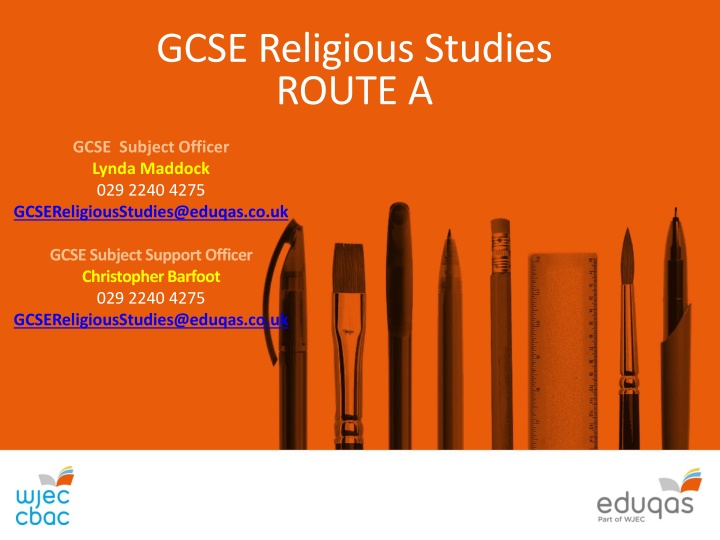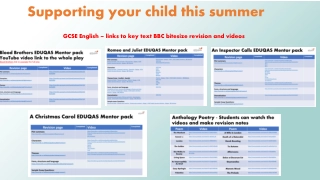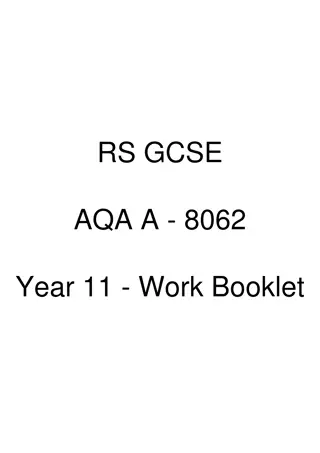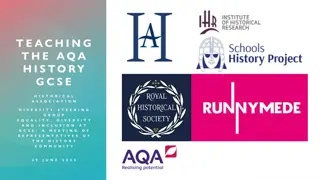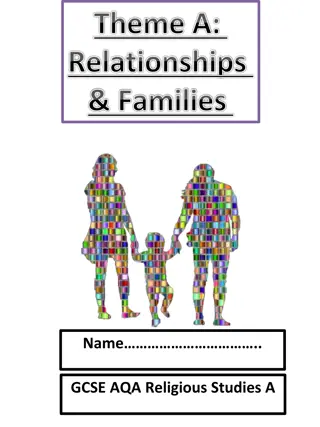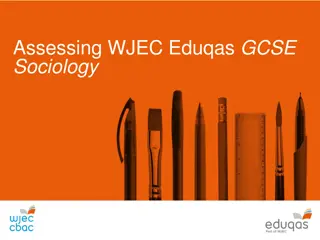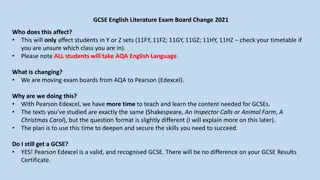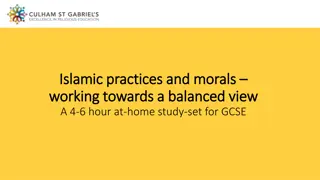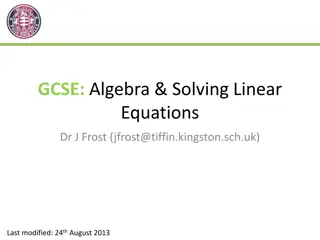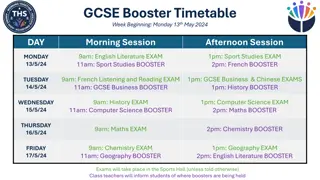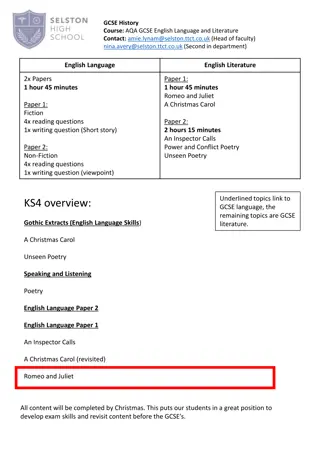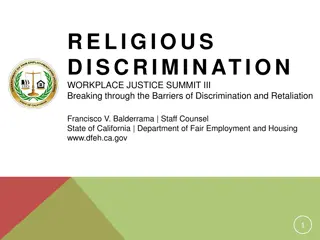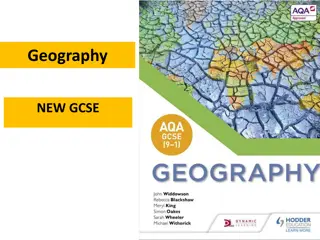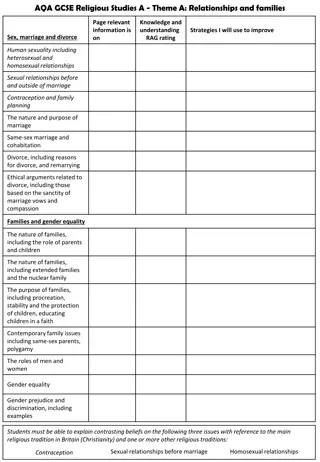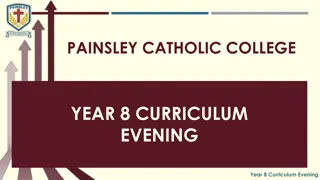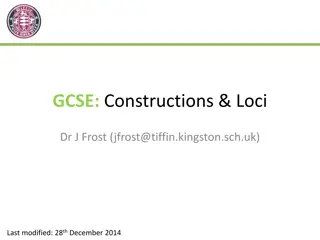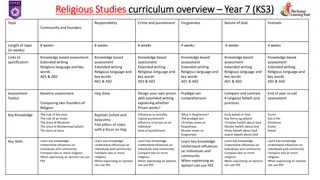GCSE Religious Studies
This content covers the key terms, command words, and assessment criteria for GCSE Religious Studies Route A examinations. It provides guidance on defining, describing, explaining, and evaluating religious perspectives and beliefs. The content emphasizes the importance of considering multiple viewpoints and incorporating non-religious beliefs where appropriate in responses. It also highlights the expectations for discussion and evaluation in answering questions related to religious and non-religious topics.
Download Presentation

Please find below an Image/Link to download the presentation.
The content on the website is provided AS IS for your information and personal use only. It may not be sold, licensed, or shared on other websites without obtaining consent from the author.If you encounter any issues during the download, it is possible that the publisher has removed the file from their server.
You are allowed to download the files provided on this website for personal or commercial use, subject to the condition that they are used lawfully. All files are the property of their respective owners.
The content on the website is provided AS IS for your information and personal use only. It may not be sold, licensed, or shared on other websites without obtaining consent from the author.
E N D
Presentation Transcript
GCSE Religious Studies ROUTE A GCSE Subject Officer Lynda Maddock 029 2240 4275 GCSEReligiousStudies@eduqas.co.uk GCSE Subject Support Officer Christopher Barfoot 029 2240 4275 GCSEReligiousStudies@eduqas.co.uk
FOUR Command Words for GCSE (AO1/2) Meaning Definition of a key term (linked to one of the eight key terms) What is meant by Define . AO1 Describe AO1 Demonstrate knowledge and understanding by describing a belief, teaching, practice, event etc. Demonstrate knowledge and understanding of a topic by explaining the statements made with reasoning and/or evidence e.g. Explain how .. Explain why .. Explain the main features of .. Explain the importance/significance of .. Explain . AO1 Explain questions for qu.(c) in Component 1 ONLY, ask for TWO RELIGIOUS perspectives (see SAMs and specific level descriptors). The two views can come from traditions WITHIN a religion OR from two different religions. Non-religious beliefs are NOT appropriate here. Candidates will lose marks if they do not offer TWO RELIGIOUS responses to these questions.
Assessing the (d.) Questions Command words A02 Discuss . Discuss this statement showing that you have considered more than one point of view (you must refer to religion and belief in your answer). Evaluation of a view from more than one perspective. These perspectives can all be for the statement, all be against the statement or be a mixture of both for and against . N.B: Belief can also mean non-religious belief and non-religious beliefs can be (but don t have to be) included in all (d) questions that lend themselves to such a response. HOWEVER, Qu. 2(d) in Route A of Component 1 ONLY (Life and Death) demands that specific non-religious beliefs are included. Candidates will lose a significant number of marks if they do not include non-religious beliefs in their response to this question Across all d. questions, personal responses per se (i.e. unsubstantiated/unsupported personal views) will not be credited but personal responses that link to one or more of the banding criteria WILL be credited.
Summary 1 The a. questions will relate only to the eight key concepts TRUE 2 The b. questions will be describe type questions TRUE The c. questions are explain type questions and Component 1 c. questions ONLY will directly ask for TWO religions/religious traditions. TWO IS ENOUGH, anymore may lead to lack of sufficient depth 3 TRUE The c. questions of Component 1 are not appropriate for non-religious responses because the questions ask for TWO RELIGIOUS views. 4 TRUE Any relevant content of the Component 3 religion studied may be used by candidates in Components 1 and 2 where it is appropriate to do so e.g. In the c. questions of Component 1 which ask for two perspectives and also in certain d. questions of Components 1 and 2 where relevant i.e. where the questions lends themselves to including perspectives from other religions 5 TRUE 6 Question d. is the only question that targets Assessment Objective 2 (analyse and evaluate) TRUE ONLY Question 2d. of Component 1 in Route A (i.e. Life and Death) demands the inclusion of non- religious beliefs 7 TRUE All d. questions can include non-religious beliefs ( religion AND belief ) as long as it is appropriate to the question asked 8 TRUE The d. questions must show evaluation and reach judgements about the statement and not just be like a Component 1 c. response i.e. two explanations 9 TRUE 10 Personal responses that ALSO fulfil one or more of the criteria in the marking bands will be credited. TRUE 11 Responses that offer no personal opinion will be credited as long as the evaluation is clear to see. TRUE
Summary Sources of wisdom and authority include figures of authority as well as references to sacred and important texts. Relevant and accurate references to sources of wisdom and authority that do NOT appear in the specification content will also be credited. 12 TRUE 13 References to specific passages (e.g. John 1:14) are not necessary and will not gain extra credit. TRUE Teachings and texts do not need to be quoted directly, an accurate paraphrase, used appropriately, will be equally credit-worthy. 14 TRUE The lines do not have to be filled; quality always matters more than quantity or including a prescribed number of points. Black pen should be used, but blue will also be accepted. 15 TRUE Positive marking will be employed. This means that completely incorrect or irrelevant content in candidates responses will be ignored rather than penalised. 16 TRUE No exam board can predict grade boundaries or equate levels to grades before the first examinations series. The Ofqual website provides some guidance. 17 TRUE Further SAMs questions cannot be produced because it will limit the questions we can use in live papers. Eduqas suggests tweaking past paper questions. 18 TRUE The criteria of the marking bands is all that will be used to reach judgements. A best fit approach will be employed. 19 TRUE SPaG marks will be applied to the first d. questions of Components 1 and 2 only (6 2=12 marks). One or two minor errors could still be awarded full SPaG marks but completely irrelevant and/or completely inaccurate content cannot be awarded SPaG marks. Slight differences in spelling of non- English words will still be credited e.g. Hebrew words 20 TRUE
GENTLE REMINDERS THE CONTENT AND STRUCTURE OF THE SPECIFICATION ARE DEFINITIVE AND CANNOT BE CHANGED BY AN AWARDING BODY. ALL OTHER DOCUMENTS ARE SUPPORTIVE: EXAMPLE SCHEMES OF LEARNING, TEXT BOOKS, EXAMPLE ANSWERS ETC. ONLY THE CONTENT OF THE SPECIFICATION WILL BE ASSESSED. EXAMINATION BOARDS HAVE NO JURISDICTION OVER PUBLISHING COMPANIES.
Regional representatives South East and London, Channel Islands: Jonathan Harrington - Jonathan.Harrington@wjec.co.uk GCSE Subject Officer Lynda Maddock 029 2240 4275 GCSEReligiousStudies@eduqas.co.uk South West, East Midlands and East Anglia, Northern Ireland: David Jones - Davidr.Jones@wjec.co.uk GCSE Subject Support Officer Christopher Barfoot 029 2240 4275 GCSEReligiousStudies@eduqas.co.uk North, Scotland, Isle of Man: Catherine Oldham Catherine.Oldham@wjec.co.uk Merseyside, Cheshire, Staffordshire , West Midlands, Derbyshire: Dave Evans David.Evans@wjec.co.uk
